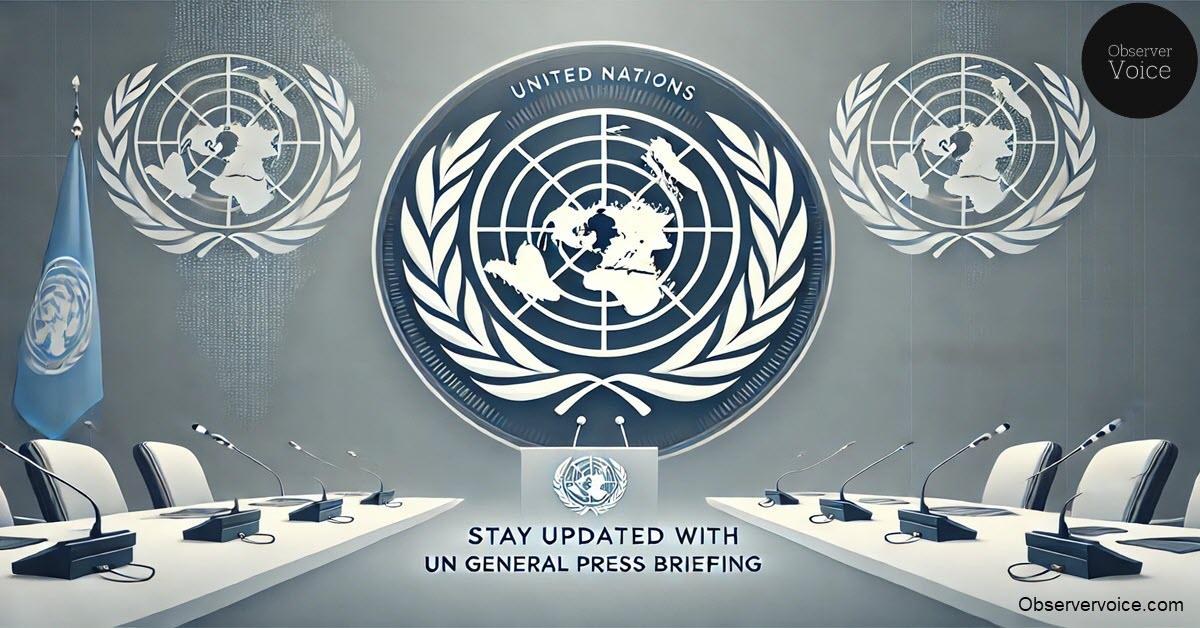UN General Assembly Adopts Key Resolutions

The United Nations General Assembly concluded its seventy-ninth session with significant decisions that will shape global cooperation over the next decade. Among the key outcomes were a comprehensive 10-year action program for landlocked developing countries, a historic convention on cybercrime, and the approval of a $3.72 billion budget for the United Nations in 2025. These resolutions reflect the Assembly’s commitment to addressing pressing global challenges and enhancing international collaboration.
Action Program for Landlocked Developing Countries
The General Assembly adopted a draft resolution titled “Programme of Action for Landlocked Developing Countries for the Decade 2024–2034.” This program aims to tackle the unique challenges faced by landlocked nations. It outlines commitments across five priority areas: structural transformation, trade facilitation, transport connectivity, climate resilience, and implementation means.
The Assembly emphasized the importance of collaboration among all stakeholders to ensure the successful implementation of this program. Originally, the adoption was scheduled for the third United Nations Conference on Landlocked Developing Countries in 2024. However, this event has faced postponements, and new dates and venues are yet to be confirmed. The Assembly’s proactive approach signifies a commitment to addressing the needs of these countries, which often face significant economic and logistical challenges due to their geographical status. By focusing on structural transformation and innovation, the program aims to enhance the economic prospects of landlocked developing nations. It also emphasizes the importance of regional integration and trade facilitation, which are crucial for these countries to connect with global markets. Furthermore, the program addresses climate change vulnerabilities, ensuring that these nations can build resilience against natural disasters and environmental challenges.
Historic Cybercrime Convention
In a landmark move, the General Assembly adopted the United Nations Convention against Cybercrime. This treaty is the first international legal framework governing cyberspace and aims to enhance cooperation among nations in combating cybercrime. The resolution was the result of five years of negotiations, which were described as challenging but ultimately fruitful. The Russian Federation’s delegate highlighted the importance of this treaty as a strong foundation for addressing crimes committed through information and communications technology. Despite the tense negotiations, the outcome is seen as a collective achievement by all Member States. The Convention fosters collaboration and bridges divides, allowing countries of various sizes and development levels to work together against cyber threats.
The treaty will be officially signed in Hanoi in 2025, marking a significant milestone in international law. It is expected to evolve further, with additional protocols to address emerging challenges in cyberspace. The Convention not only represents a legal framework but also embodies the UN’s multilateral approach to tackling global issues, reinforcing the need for international cooperation in an increasingly digital world.
United Nations Budget for 2025
The General Assembly approved a regular budget of $3.72 billion for the United Nations for the year 2025. This budget reflects an increase of approximately $1 million compared to the proposal presented by the Secretary-General in October. The Fifth Committee, responsible for administrative and budgetary matters, recommended this budget, which will support various UN operations and initiatives. In addition to the budget, the Assembly adopted several draft resolutions that entail expenditures for their implementation. These resolutions cover a range of topics, including disarmament, international security, and economic cooperation. Notably, the Assembly endorsed initiatives aimed at combating illicit financial flows and promoting sustainable development.
The budget approval is crucial for the UN’s ongoing efforts to address global challenges, including climate change, security threats, and humanitarian crises. Assembly President Philemon Yang commended the delegates for their hard work and commitment to multilateralism during the session. He emphasized the importance of the resident coordinator system in accelerating the implementation of the Sustainable Development Goals, highlighting the UN’s role in fostering global cooperation.
Commitment to Multilateralism
In his closing remarks, Assembly President Philemon Yang praised the delegates for their dedication to multilateralism throughout the session. He noted that the decisions made during these discussions would consolidate the UN’s action and presence worldwide. The Assembly’s commitment to addressing pressing global issues reflects a collective effort to strengthen international cooperation.
Yang announced that his office would launch several activities in January aimed at enhancing multilateralism and implementing the “Pact for the Future.” This initiative seeks to address emerging global challenges and reinforce the UN’s role in promoting peace, security, and sustainable development.
The Assembly also urged Member States to release relevant records related to the investigation of Dag Hammarskjöld’s tragic death. This call for transparency underscores the UN’s commitment to accountability and justice. Overall, the outcomes of the seventy-ninth session demonstrate the Assembly’s resolve to tackle global challenges through collaborative efforts and a renewed focus on multilateralism.
Observer Voice is the one stop site for National, International news, Sports, Editor’s Choice, Art/culture contents, Quotes and much more. We also cover historical contents. Historical contents includes World History, Indian History, and what happened today. The website also covers Entertainment across the India and World.

